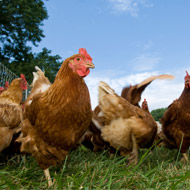Avian influenza prevention zones lifted

There have been no cases of H5N6 avian influenza in poultry in the UK this year.
Avian Influenza Prevention Zones in England and Wales have been lifted after an assessment found the risk level in wild birds has reduced to low.
The move means that poultry keepers in England and Wales are no longer required to follow strict biosecurity requirements. Keepers of birds, however, are still encouraged to follow biosecurity advice for good practice, no matter the size of their flock.
Earlier this month, an updated veterinary risk assessment carried out by the Animal and Health Plant Agency (APHA) suggested there is now a decrease in the likelihood of finding a case of H5N6 in England and Wales.
There has only been only one finding of the disease in a wild bird in Wales this year, and the last recorded case in the UK was on the 18 April in Suffolk. There have been no cases of H5N6 avian influenza in poultry in the UK this year.
Welsh cabinet secretary Lesley Griffiths said: “In January, I took action and declared the whole of Wales an Avian Influenza prevention Zone in response to Highly Pathogenic Avian Influenza H5N6 finding in England. This was a precautionary measure to minimise the risk of infection to poultry here in Wales.
“We have since been monitoring the situation closely and the latest risk assessment by APHA has concluded that the risk has reduced from High to Low for wild birds and the risk to poultry is also low.”
Chief veterinary officer for Wales, Christianne Glossop added: “I cannot stress enough the need for all keepers or poultry and other captive birds to remain vigilant for signs of the disease and to continue to practice the very highest levels of biosecurity.
“If anyone suspects disease they should contact the APHA immediately. Also, we can all play a part in supporting the ongoing surveillance by reporting any findings of dead wild birds to the GB helpline.”



 The Federation of Independent Veterinary Practices (FIVP) has announced a third season of its podcast, Practice Matters.
The Federation of Independent Veterinary Practices (FIVP) has announced a third season of its podcast, Practice Matters.